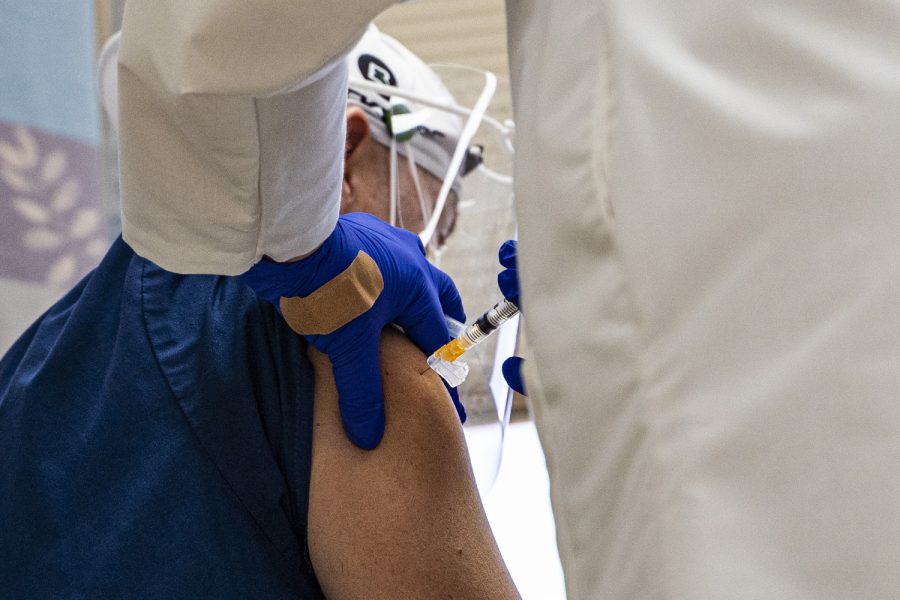Opinion | Misinformation about the COVID-19 vaccine is incredibly dangerous
We have seen how powerful social media is in spreading information. With the emergence of the COVID-19 vaccine, it’s important to make sure that information is accurate
Shivansh Ahuja for The Daily Iow
Patients are injected with the COVID-19 vaccine at the VA Medical Center in Iowa City on Tuesday, Dec. 22, 2020. The center received the Modern vaccine for its employees.
January 24, 2021
Nearly a year has passed since the start of the COVID-19 pandemic. With the virus came fear and uncertainty because of fast-spreading misinformation.
Social media plays an intrinsic role in our society and has become a lightning-quick outlet for information. With the emergence of a vaccine, it’s important that correct information is circulating rather than fear mongering false information that will turn people away.
We have witnessed through this year how misinformation endangered health care workers handling the pandemic, such as the false idea that masks are not effective ways to curb the spread of the virus. Now, we are seeing more wrong claims circulate about the vaccines.
Because of the novelty of the COVID-19 vaccine, misleading information could be detrimental to slowing the spread of the virus and encouraging people to get vaccinated.
Social media companies are now challenged with the task of keeping up with false claims and conspiracies about the vaccine. Shortly after the vaccine came out, social media was filled with false claims about the vaccine altering people’s DNA or not being able to keep up with the mutated strains of the virus.
The spread of this information only instills fear and distrust in people, perpetuating the severity of COVID-19 in the U.S.
In Iowa, 144,955 COVID-19 vaccines have been administered as of Jan. 2. 4.12 percent of the population has received at least a single dose of the vaccine. However, the number of people fully vaccinated is only 12,629.
As of this month, 9,411 doses of the COVID-19 vaccine have been administered in Johnson County, making Johnson County the second-highest county in number of vaccines administered in the state.
According to MU Health Care, it would be ideal to have 80-90 percent of the population vaccinated in order to achieve herd immunity.
With only 4.12 percent of the state vaccinated, Iowa has a long way to go. Spreading accurate information is crucial to administering the COVID-19 vaccine.
As of November, 60 percent of U.S. adults reported that they would get the COVID-19 vaccine with only 37 percent feeling comfortable being among the first vaccinated.
These numbers were found to be influenced by many different factors. However, hesitation mainly stemmed from whether people had concerns of falling ill, levels of trust in the vaccine, and participant’s experience receiving other vaccines.
People’s willingness to receive the COVID-19 vaccine heavily relies on their trust in the medicine behind it.
It’s understandable that there would be doubts and concerns about receiving a vaccine for a virus— especially for marginalized communities that historically have been exploited by medical professionals. This is why it is all the more important to make sure there is easily accessible accurate information circulating through the media.
Columns reflect the opinions of the authors and are not necessarily those of the Editorial Board, The Daily Iowan, or other organizations in which the author may be involved.


















